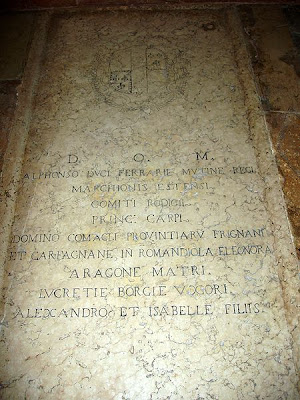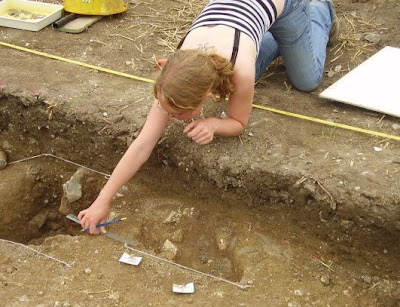The name Lucrezia Borgia is synonymous with incest and corruption, helped along its way by contemporary reports from anti Borgia factions as well as modern day interpretations of this blonde haired Italian temptress. These days, thanks to the interpretation of the Assassins Creed franchise, we still think of Lucrezia as a woman who enjoyed poisoning people from a hidden ring and who was involved romantically with her brother Cesare. But was this really the case? Or was she merely a political pawn in the games of her father and brother?

Lucrezia Borgia from Ubisofts Assassins Creed 2: Brotherhood
Lucrezia has interested me now for a long time, and I devour books on the Italian Renaissance and the Borgia family. And she inspires me too, as from my reading I can just tell that she was a strong woman who was able to overcome obstacles. After all, she managed to forgive her brother after he had her second husband assassinated and she always maintained her dignity in the face of such obstacles. As well as the picture above, we have seen Lucrezia in the HBO television series "The Borgias" in which she is played by the fantastic Holliday Granger. In the series we see a young Lucrezia who is very close to her brother (there are hints of the incest rumours, but they walk a very fine line with that. For me, the way they show the relationship between Cesare and Lucrezia just shows that they were very, very close) and a girl who is used as a pawn by her father Rodrigo. Yet we also see the beginnings of her guile, when she deliberately makes her first husband slip on a wet floor and we see her agree with her fathers plan to have the pair divorced due to impotence.

Holliday Granger as Lucrezia in The Borgias
But who was Lucrezia Borgia, and why do we still think of her as the evil, incestuous woman from the Renaissance?
Born in around April 1480, Lucrezia Borgia was the illegitimate daughter of Rodrigo Borgia (later Pope Alexander VI) and Vanozza Cattanei. Her three brothers were Cesare, Giovanni (also known as Juan) and Gioffre - Juan was later found dead in the Tiber, and his murder is often linked to Cesare although this may again be based on rumours from the anti Borgia faction. Lucrezia was part Spanish, Rodrigo coming from Spain, and the family was hated due to their Spanish roots. Even when Rodrigo became Pope the family were still the centre of political hatred, scandal and rumour. In 1493 Lucrezia was married to Giovanni Sforza, the marriage completed by proxy and Lucrezia was sent off to Pesaro to live with her new husband. This was a marriage of convenience and politics - the Pope needed the Sforza's on his side, but when the Pope tired of the Sforza's he arranged a divorce for his daughter. The marriage was dissolved on the grounds of impotence, which in itself is laughable. Sforza certainly was not impotent, he already had children from his first marriage and stated firmly that he had known Lucrezia hundreds of times! When the College of Cardinals asked Sforza to prove it publicly, Sforza refused and the marriage was dissolved. This incident, as stated by Sarah Bradford in her book "Lucrezia Borgia" may have been what sparked off the rumours of incest between Lucrezia and her father, as Sforza claimed that the Pope wanted her all for himself!
Lucrezia's name was further dragged into scandal around this time when she became involved with a man named Perotto, and he was found drowned in the Tiber (rumour again stated this was down to Cesare!). Many said the two were having an affair. Lucrezia's second marriage was to Alfonso of Aragon, Duke of Biscelie, and seemed to be a happy one but yet again this would end in disaster. Cesare soon became jealous that Lucrezia was giving the handsome Alfonso all her attention. Early in the marriage Lucrezia suffered her first miscarriage (a pattern that would manifest throughout her life) and on 15th July 1500 her husband was publicly attacked in Rome and was badly wounded. Yet he began to recover, being looked after by Lucrezia and one of her trusted doctors. On 18th August when Alfonso was sat up in bed talking to his wife Michelloto de Corella burst into the room stating that Alfonso's uncle had been taken prisoner and that Lucrezia must petition the pope for his release. When she returned Alfonso was found strangled, dead in his bed. Rumour sparked yet again that this was the deed of Cesare, which seemed likely considering that Michelloto was known to be Cesare's henchman and assassin. Lucrezia mourned the loss of Alfonso heavily, so much so that her father sent her away whilst her father began to get her back on the marriage market. She was soon to become Duchess of Ferrara.
Lucrezia married Alfonso D'Este in around 1502 and lived a comfortable life with her new husband. Whilst the two of them often committed adultery they ended up developing a mutual respect for each other, despite not loving each other. Lucrezia though gave Alfonso many children, and they were happy enough. The mutual respect may have even made way to a kind of love from her husbands side, and they often wrote letters to each other whilst her husband was away, the both of them concerned for each others safety. During this time, the biggest event in Lucrezia's life was to happen: the death of her brother Cesare. He was killed in a battle at Vianna after escaping imprisonment at the Medina Del Campo in Spain, and Lucrezia found out much later. Once again she grieved heavily and despite all the wrongs he had done to her, she still cherished him. On the outside though Lucrezia did not show her grief, it was as if through all her hardships she developed a tough outer shell and was determined not to look weak, a sign of the Borgia strength that she so often exhibited and an asset to her personality.
In July 1509 Lucrezia passed away after developing complications giving birth to her eighth child. Despite clinging to life for ten days she remained very unwell and her doctors were of the opinion that her illness was caused by a buildup of menstrual blood that had become infected. The doctors tried everything for her, from bleeding to cutting off all her hair yet nothing worked. She had just turned 39 when she died, and was buried in Ferrara.

Lucrezia Borgia certainly lived a remarkable life, through the trials of life, love and death. She was the daughter of one of the most influential men in Renaissance Italy so is it any wonder that her name was dragged into scandal? In all of my reading, I have never once come across a credible source that proves she was guilty of poisoning or even incest and thus I will keep believing that she was innocent of these acts until anything new comes to life. Like so many women in history, the name of Lucrezia Borgia has been maligned thanks to propaganda and rumour. After all, people still talk of Anne Boleyn as a witch with 6 fingers who slept with her brother and countless other men despite the fact that all of these have been shown as being untrue. The same goes for Lucrezia, and despite how maligned she has been over the years I will continue to admire her. She had a remarkable life, lived through the scandals of her fathers world, watched those close to her be murdered, had countless stillbirths yet still retained that Borgia strength and dignity which was something to be proud of.
Sources:
Bradford, S, 1976, Cesare Borgia: His Life & Times, Weidenfeld and Nicholson: London
Bradford S, 2004, Lucrezia Borgia: Life, Love & Death in Renaissance Italy, Penguin: London






